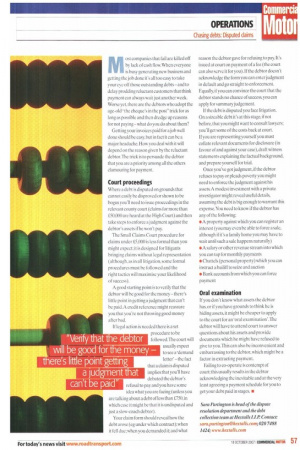CHASING THE PENNIES
Page 56

Page 57

If you've noticed an error in this article please click here to report it so we can fix it.
Chasing debts can be the difference between your company surviving and going to the wall. Sara Partington explains the legal steps you can take when the client disputes your claim.
Most companies that fail are killed off by lack of cash flow. When everyone is busy generating new business and getting the job done its all too easy to take your eye off those outstanding debts— and to delay prodding reluctant customers that think payment can always wait just another week. Worse yet, there are the debtors who adopt the age-old "the cheque's in the post" trick for as long as possible and then dredge up reasons for not paying — what do you do about them?
Getting your invoices paid for a job well done should be easy. but in fact it can be a major headache. How you deal with it will depend on the reason given by the reluctant debtor. The trick is to persuade the debtor that you are a priority among all the others clamouring for payment.
Court proceedings
Where a debt is disputed on grounds that cannot easily be disproved or shown to be bogus you'll need to issue proceedings in the relevant county court (claims for more than £50,000 are heard at the High Court) and then take steps to enforce a judgment against the debtor's assets if he won't pay.
The Small Claims Court procedure for claims under £5,000 is less formal than you might expect; it is designed for litigants bringing claims without legal representation (although, as in all litigation, some formal procedures must be followed and the right tactics will maximise your likelihood of success).
A good starting point is to verify that the debtor will he good for the money —there's little point in getting a judgment that can't be paid.A credit reference might reassure you that you're not throwing good money after bad.
If legal action is needed there is a set procedure to be followed.The court will usually expect to see a 'demand letter' — the fact that a claim is disputed implies that you'll have debated the debtor's refusal to pay and you have some idea what you are facing ( unless you are talking about a debt of less than £750, in which case it might be that it is undisputed and just a slow-coach debtor).
Your claim form should reveal how the debt arose (eg under which contract); when it fell due; when you demanded it; and what reason the debtor gave for refusing to pay. It's issued at court on payment of a fee (the court can also serve it for you). If the debtor doesn't acknowledge the form you can enterjudgment in default and go straight to enforcement. Equally, if you can convince the court that the debtor stands no chance of success, you can apply for summary judgement.
If the debt is disputed you face litigation. On a sizeable debt it's at this stage,if not before, that you might want to consult lawyers; you'll get some of the costs back at court. If you are representing yourself you must collate relevant documents for disclosure (in favour of and against your case),draft witness statements explaining the factual background, and prepare yourself for trial.
Once you've got judgment, if the debtor refuses to pay or pleads poverty you might need to enforce the judgment against his assets. A modest investment with a private investigator might reveal useful details, assuming the debt is big enough to warrant this expense. You need to know if the debtor has any of the following: *A property against which you can register an interest (you may even be able to force a sale, although if it's a family home you may have to wait until such a sale happens naturally) • A salary or other revenue stream into which you can tap for monthly payments • Chattels (personal property) which you can instruct a bailiff to seize and auction • Bank accounts from which you can force payment
Oral examination
If you don't know what assets the debtor has, or if you have grounds to think he is hiding assets, it might be cheaper to apply to the court for an 'oral examination'. The debtor will have to attend court to answer questions about his assets and provide documents which he might have refused to give to you. This can also he inconvenient and embarrassing to the debtor, which might be a factor in extracting payment.
Failing to co-operate is contempt of court: this usually results in the debtor acknowledging the inevitable and at the very least agreeing a payment schedule for you to get your debt paid in stages. •






























































































































































































